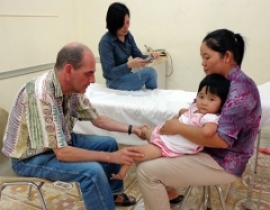
Hoai Thuong (2nd, right), a victim of Agent Orange, were examined for orthopedic surgery with the help of the veterans in HCMC.
Photo: Tuoi Tre
SHI, founded by Ed Tick, a poet and author of “War and The Soul”, has become a link between foreign benefactors and Vietnamese victims of war. It organizes journeys to Vietnam every year for healing, reconciliation and atonement.
In the first half of 2012, Vietnamese victims received US$10,000 from US veterans and 2,200 euros from overseas Vietnamese in France through the work of this charitable organization. The funds were used to help 21 children suffering from congenital defects improve their mobility.
Benevolent work
One day Paula, one of the American benefactors and also a member of Soldier's Heart Initiative, met Dang Hong Nhut, vice-chairman of the Association for Victims of Agent Orange/dioxin Ho Chi Minh City, to donate US$1,000 of her own money to help the victims.
Nhut received the donation with a very happy smile, “With this money, you could help two children with congenital defects have the opportunity to walk by themselves like other people”.
Paula was so touched to hear what her money could do that she returned the next day to donate US$1,500 from her family.
Paula’s donation was not only money, but also her full attention to the unfortunate. Before returning to the US, Paula went to the Orthopedic Hospital in Ho Chi Minh City with Nhut and some children to prepare for their upcoming surgeries and donated VND 10 million more. After returning home, Paula sent US$2,000 more back to Vietnam for the children’s medical treatment, as well as their hospital costs and food.
According to the Association, thanks to Paula, these children were able to have everything they needed to recover their strength after surgery and improve their mobility. Nhut shared, “All of these children were born in poverty-stricken families, so they cannot afford either hospital fees, medicine costs, or anything, even food.”
For years, American benefactors have come to Vietnam to share their knowledge about Agent Orange and dioxin detox methods, as well as to teach physiotherapy exercises to victims.
Rosa Minot, 70, a volunteer translator working for charitable organizations in Ho Chi Minh City, recalled, “Once I visited the War Remnants Museum, I was stunned by what the Agent Orange had done to the innocent children in Vietnam, so I decided to do something for them. I took a lot of victims’ pictures from the Association for Victims of Agent Orange/dioxin Ho Chi Minh City and sent them to my daughter, who is also working at a charitable organization in the US and asked her to do something urgently.”
Also, at the 51st anniversary of the Agent Orange Disaster in Vietnam, Rosa carefully took many photographs and sent them to her daughter and Paula. Together, they are appealing on behalf of Vietnamese victims of war. Rosa and Paula, who had never met each other before in their home country, have become friends because they both have a similar purpose – to help Vietnamese victims after war.
To overcome fate
In early 2012, an American man who was looking for documentations of post-war psychiatric disorders in Vietnam, came to meet Nhut. He said, “I have witnessed the post-war psychiatric disorders occurring in American veterans who directly participated in the Vietnam War. Many of them have metal disorders, war obsession or have even killed themselves. How could Vietnamese people, like you, who lived through fierce wars and suffered both physical and mental damage, regain confidence and joy of life while Americans could not? ”
Nhut recalled, “I think the reason is we fought for self-defense, so we totally volunteered to join the war. Moreover, Vietnamese soldiers always think that survival is already a great gift. Therefore, we just want to forget everything to live happily and rebuild our country.”
Paula, in a letter she sent to Vietnam this August, wrote, “I believe that Vietnamese victims of Agent Orange have the ability to overcome all of the pain through their outstanding courage. Thanks to their spirit, I understand how love and peace are stronger than hostility and war.”
In response to the anniversary of the Agent Orange Disaster in Vietnam, Jeanne Mirer, a lawyer in New York as well as president of the International Association of Democratic Lawyers (IADL), and Marjorie Cohn, a professor at Thomas Jefferson School of Law - California and former president of the IADL, wrote an appeal letter in which they asked people all over the world to spend at least 51 seconds thinking about the horror of war and resolve to stop other wars and violent crimes from happening around the world.
Especially in the US, people signed their names in orange letters and sent them to the United States Congress as an appeal for the approval of bill HR 2634 – Victims of Agent Orange Relief Act of 2011. Mirer and Cohn believe that this activity will foster the development of Vietnam-US post-war reconciliation programs.
Tuoi Tre






